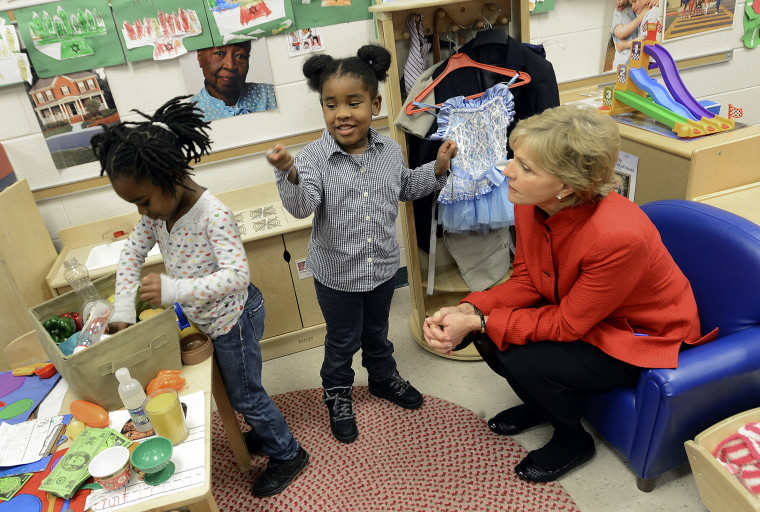President Obama addressed the need for access to high-quality early education for every child during his State of the Union address Tuesday night.
Study after study shows that the sooner a child begins learning, the better he or she does, down the road. But today, fewer than 3 in 10 four year-olds are enrolled in a high-quality preschool program. Most middle-class parents can't afford a few hundred bucks a week for private preschool. And for poor kids who need help the most, this lack of access to preschool education can shadow them for the rest of their lives.Tonight, I propose working with states to make high-quality preschool available to every single child in America. Every dollar we invest in high-quality early education can save more than seven dollars later on—by boosting graduation rates, reducing teen pregnancy, even reducing violent crime. In states that make it a priority to educate our youngest children, like Georgia or Oklahoma, studies show students grow up more likely to read and do math at grade level, graduate high school, hold a job, and form more stable families of their own. We know this works. So let's do what works, and make sure none of our children start the race of life already behind. Let's give our kids that chance.
Education Secretary Arne Duncan said earlier this month that early education will be key in Obama's second term. This push to improve the accessibility to early education programs comes after a report last year that showed the United States ranked 28 out of 38 countries in preschool enrollment.
Obama also announced a new challenge "to redesign America's high schools so they better equip graduates for the demands of a high-tech economy." He referred to the successes of his administration's Race to the Top initiative, and added that the high schools that developed new partnerships with colleges and employers would be further rewarded.
Much as in his 2012 State of the Union address, Obama emphasized the importance of college affordability:
It's a simple fact: the more education you have, the more likely you are to have a job and work your way into the middle class. But today, skyrocketing costs price way too many young people out of a higher education, or saddle them with unsustainable debt.Through tax credits, grants, and better loans, we have made college more affordable for millions of students and families over the last few years. But taxpayers cannot continue to subsidize the soaring cost of higher education. Colleges must do their part to keep costs down, and it's our job to make sure they do.
He urged Congress to change the Higher Education Act to include affordability and value when determining which colleges receive certain types of federal aid, and added a new "College Scorecard" that will be released this week to help parents and students choose a college that best suits their needs.
Obama concluded his "To Do list" for education by bringing the conversation back to the economy: "To grow our middle class, our citizens must have access to the education and training that today's jobs require. But we also have to make sure that America remains a place where everyone who's willing to work hard has the chance to get ahead."
